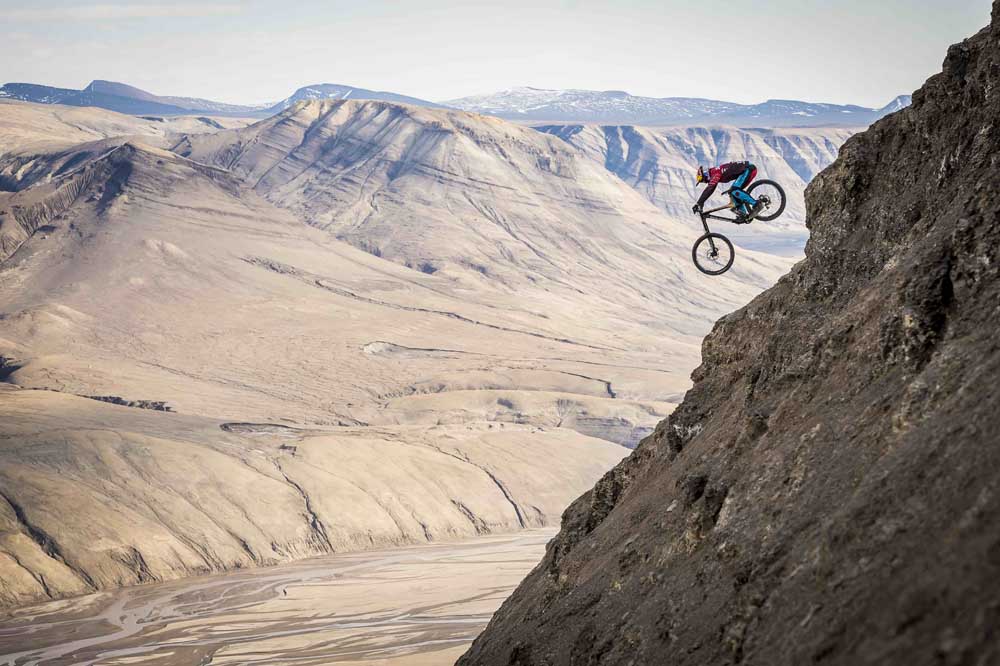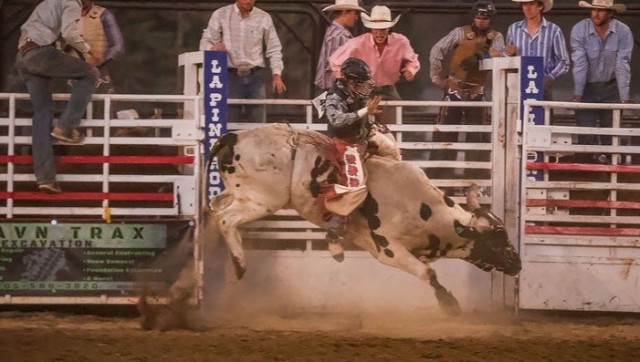Bend mountain biker Carson Storch hits the big time
Published 12:00 am Sunday, June 3, 2018

- Bend’s Carson Storch launches himself down a mountainside on the remote Canadian island of Axel Heiberg in a scene from the film “North of Nightfall.” (Blake Jorgenson/Red Bull Media House)
Riding a mountain bike along a knife-edge ridge in the middle of an Arctic nowhere, Carson Storch found himself last summer at the top of his sport. The 25-year-old Storch, a professional mountain biker, specializes in “free riding,” a discipline in which mountain bikers trace their own course down steep hills while performing tricks off natural or man-made features. In the new documentary “North of Nightfall,” which world premiered at the Tower Theatre in Bend on Wednesday, Storch rode through a remote, otherworldly landscape as the cameras rolled.
The film features the young Storch and other more veteran mountain bikers riding on the uninhabited Canadian island of Axel Heiberg, less than 700 miles from the North Pole. Their downhill routes — riders call them “lines” — would descend as much as 2,000 feet, the riders streaking onto flat stretches of the island at 60 mph.
The rugged, remote island allowed the riders the freedom to hike and then descend the massive Arctic desert mountains as if snowboarding, but on a bike. With virtually nobody around but the riders and the film crew and no medical help nearby, the consequences of a bad crash could have been dire as they rode and filmed during 24 hours of daylight in the Arctic summer.
“The whole thing was insane,” Storch said in a recent interview at his home in Bend, adding that the terrain was conducive to the sort of progressive, free-ride style he and other riders prefer.
“Lots of exposure, and really steep,” he said. “Not as many pits and valleys as in Utah; it was more drawn out. It’s way bigger terrain.”
Storch called the filming expedition the biggest opportunity of his career because he got to work with free-ride mountain biking legends Darren Berrecloth and Cam Zink and Red Bull Media House, a global, multi-platform media company that produces adventure sports films.
“It’s like a legendary film crew,” Storch said. “They’ve made all the major mountain bike movies since our sport began.”
His work in “North of Nightfall” has further launched Storch’s career and provided him the freedom to reduce his competition schedule and segue more into films. And with 45,000 Instagram followers, Storch is getting accustomed to a modicum of fame.
“People know who he is, not just in Bend,” said Storch’s mother, Tricia Leagjeld. “Little kids come up and ask for his autograph.”
A 2011 graduate of Summit High School, Storch grew up snowboarding, skateboarding and riding dirt bikes and mountain bikes in Central Oregon. As a middle-schooler in Bend, he and his friends would film skateboarding videos on the ramp in the backyard of his house.
But by the time he was 15, Storch knew mountain biking was his sport, he said.
With sponsorship from Red Bull energy drink, among many others, Storch is making a living as a professional freeride mountain biker, traveling the world for the occasional contest, but mostly films. He always returns in the offseason to Bend, where he was born and raised. His parents and two younger sisters also live in Bend.
Storch’s competition specialty is slopestyle mountain biking, which — like slopestyle in skiing and snowboarding — includes riding down a series of jumps and features (like rails), and getting judged on tricks performed off those jumps. Mountain bikers often execute tricks such as flips, spins and tail whips.
In 2016, Storch finished third and won the Best Trick award in the Red Bull Rampage, a high-profile, NBC-televised event in which mountain bikers rode down precipitous cliffs and launched off a series of natural jumps near Zion National Park.
He said winning the Best Trick award that year “fully shifted gears” in his career. Instead of staying on the slopestyle world tour and competing, he has since focused on filming and big-mountain riding, limiting his contest schedule to the Rampage and a few others.
“The opportunities are presenting themselves, and I’m getting more chances to do what I want to do,” Storch said. “It’s kind of the dream to compete and build your name up and then be able to film, and that’s pretty much where I’m at right now.”
Storch called the four-week trip to the Canadian Arctic Archipelago for “North of Nightfall” the “experience of a lifetime.” According to a news release about the film, the only inhabitants of Axel Heiberg are glaciologists who study the glacial melt there for six weeks of the year.
The reason they can ride the island’s rugged terrain is because of the glacier melt, Storch said. “As the ice recedes, it just exposed this Arctic desert that had this perfect terrain, and all the lines were around 2,000-foot descents,” he said.
Storch added that it was relatively warm for most of his time there — about 40 degrees — and there was 24 hours of daylight. All he pictured was flat expanses of ice. But in the airplane flying over, he started to notice mountains poking out.
Axel Heiberg is 14,000 square miles, with an alpine topography and a central mountain range (Princess Margaret Range) that includes peaks 3,000 to 6,000 feet high, according to the Canadian Encyclopedia. Glacial melt exposed long, smooth, desert terrain on these mountains, making it possible for Storch and others to hike and then descend in creative riding styles and with death-defying airborne tricks.
“It was perfect for what we were doing,” Storch said. “Such huge terrain, and it was so vast. It went on forever. We could spend 10 years up there going up there every summer, but obviously that’s not a possibility.”
Storch said he was grateful for the chance to make the trip and the movie.
“It’s one of the biggest highlights I’m sure I’ll have in my career,” he said.
Storch said he learned much from Berrecloth and Zink, who also star in the film. He took inspiration from snowboarding — his first passion — while riding the big mountains of Axel Heiberg.
“It’s as close to big mountain ski and snowboard as you can get on a bike,” Storch said. “That was definitely the inspiration on a lot of lines we rode. The ice-melt made perfect run outs. You ride your line, and at the end of it, you just let go of your brakes and ride 60 miles an hour out into the flats.”
As a youngster, Storch competed on the Mt. Bachelor Sports Education Foundation’s freeride snowboarding team. He loves snowboarding, but mountain biking is his true calling.
“I felt like I was in the most control, and I had the most fun when I rode mountain bikes, compared to anything else I did,” Storch said. “But snowboarding is my main motivation for the tricks I do and the way I ride. This big-mountain stuff … I just pretend I’m on a board. To me, it’s the most fun thing.”
Storch’s mother thought her son would go to college, major in business, and become an entrepreneur. It hasn’t worked out that way, but she is impressed with the direction of her son’s career. Still, it is hard for a mom to watch her son launch himself off cliffs on his bike.
The transition from competition to films has been a bit of a relief because the potential for injury is not as great, she said.
“I think it’s better for his health, in terms of getting injured,” Leagjeld said. “It’s still there, because he does that kind of stuff every day. But it’s definitely a less-intense environment. When you compete, you’ve got nerves and pressure.”
Even while his star brightens, Storch has always been at the forefront of promoting freeride mountain biking in Central Oregon and building areas for local kids to jump their bikes. He was heavily involved with the construction of the Lair freeride area west of Bend when he was a teenager, and he has helped with smaller jump parks in Prineville and Sisters, among others.
Storch and some of his friends — other freeride mountain bike pros who have moved to Bend — are working with the Bend Park & Recreation District on a freeride area at Big Sky Park in east Bend.
“Bend has all the potential in the world to be a freeride mecca, too,” Storch said. “The public trail systems are great, and I love them, but there’s a lot of potential for a lot more progression. It’s just leading to good things for our side of the sport. We’re all working hard at building up the scene here.”
— Reporter: 541-383-0318, mmorical@bendbulletin.com








